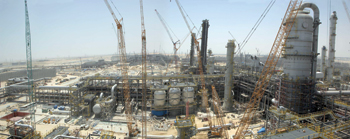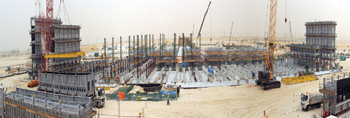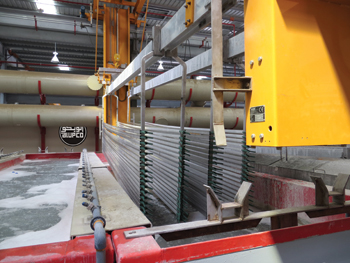
 Sadara complex, Jubail ... single phase development.
Sadara complex, Jubail ... single phase development.
A mega chemicals complex – the world’s largest to be built in a single phase – comprising 26 manufacturing units is on its way to completion in Jubail this year, opening new vistas of opportunities for downstream industries.
CONSTRUCTION of the $20-billion Sadara Chemical Company complex in Jubail Industrial City Two, Saudi Arabia, is 75 per cent complete and proceeding according to schedule, with the best-in-class record in safety.
The chemicals complex is a joint venture developed by the Saudi Arabian Oil Company (Saudi Aramco) and The Dow Chemical Company.
The complex is the world’s largest to be built in a single phase and will be the first in the Middle East to use refinery liquids, such as naphtha, as feedstock.
The total investment for the project, including third-party investments, will be approximately $20 billion.
Launched in November 2011 and scheduled to become operational in 2015, Sadara will be a big part of Saudi Aramco’s strategy to diversify the kingdom’s economy, creating business opportunities for Saudi entrepreneurs and jobs for thousands of talented Saudis.
According to Ziad Al Labban, CEO of Sadara, the complex has reached peak construction with more than 54,000 dedicated construction personnel on site at the beginning of the fourth quarter, 2014.
“A key differentiator for Sadara is our commitment to further developing Saudi Arabia’s downstream industry and the concept of ‘Made in Saudi Arabia’ through the visionary idea of PlasChem Park, a collaboration between Sadara and the Royal Commission for Jubail and Yanbu,” says Al Labban.
“With 14 of the 26 manufacturing units being constructed at the Sadara complex completely new to the kingdom, we will enable a host of opportunities for local Saudi and international players to invest in facilities to capitalise on and make use of our differentiated products, thereby jumpstarting this key downstream manufacturing concept,” says Al Labban.
Khalid Al Falih, Saudi Aramco president and CEO, comments: “Sadara is probably the planet’s most complex engineering undertaking — not just now, but at any time. Whether it’s scale, complexity, advanced technology or economic and commercial impact, it is in a league of its own.”
Sadara is on track to deliver its first products in the second half of 2015, with the complex in full operation in 2016. Once operational, Sadara is expected to deliver annual revenues of approximately $10 billion within a few years of operation.
Once built, Sadara will have the capacity to produce three million tonnes per year of high quality chemical products such as polyethylene, propylene oxide, elastomers, glycol ethers, amines, isocyanates and polyether polyols, many of which have never previously been produced in the kingdom.
By using best-in-class technologies to crack refinery liquid feedstock, Sadara will enable many industries that either currently do not exist in Saudi Arabia or only exist through imports of raw materials. It will create an environment where Saudi entrepreneurs can establish manufacturing companies using those chemical products to make everything from paints and sealants to insulation and auto parts and even toothpaste.
 |
|
Sadara ... creating downstream opportunities. |
Al Falih explains: “Many of Sadara’s products will be produced for the very first time in Saudi Arabia. This will enable significant development in the country’s conversion industry, thereby supporting Saudi Arabia’s ambition to be a magnet for downstream manufacturing investments that add significant value to the kingdom’s hydrocarbon resources.”
The adjacent PlasChem Park, a unique collaboration between Sadara and the Royal Commission for Jubail and Yanbu, will create more value downstream, generating unprecedented investment, innovation, economic growth and thousands of jobs.
Sadara will have responsibility for product marketing within a local zone of eight countries. Dow will market and sell on behalf of Sadara to all countries outside the Middle East zone.
By completion, more than 160,000 tonnes of steel will have been be used in its construction, enough to build two Golden Gate bridges. Also, 1 million cu ft of concrete will have been poured, enough to build the equivalent of three King Fahad causeways to Bahrain; and 2,500 km of pipe will have been laid, enough to stretch from Jubail to Jeddah and back.
All of this has been done with a keen eye toward Saudi Aramco’s corporate value of safety. As of September 16, a recorded 228,968,755 man hours had been conducted without a reportable injury.
“The world is watching us,” says Andrew Liveris, CEO of Dow Chemical Company. “Customers around the world are watching; they have already signed letters of intent matching more than 100 per cent of planned capacity.”
“Our industry is watching as we construct the most incredible industrial complex of our time,” Liveris says. “They know about Saudi Aramco’s incredible reputation, and they know about Dow’s. They believe that if anyone can pull this off, we can.”
Downstream companies
Meanwhile, Sadara is building the world’s largest butanol plant in Jubail in a joint venture with Saudi Kayan Petrochemical Company (Saudi Kayan) and Saudi Acrylic Acid Company (SAAC).
With an estimated investment of $517 million, the new venture Saudi Butanol Company (SaBuCo) will build the first ever butanol plant in the Middle East and its products will support growth of the paints and coatings industry in Saudi Arabia. The design capacity of the plant, which is scheduled to go on stream this year, is 330,000 tonnes per year (tpy) of n-butanol and 11,000 tpy of iso-butanol.
Al Labban says: “This is another example of success through teamwork and collaboration. We are pleased to team up with Saudi Kayan and SAAC in this joint venture to create further downstream economic value in Saudi Arabia from butanol-based products.”
Mazyad Al Khaldi, Saudi Kayan president, says the project will add a new product to the Saudi Kayan portfolio, which will contribute to the development of the local downstream industry.
Saleh Al Nazha, National Industrialisation Company (Tasnee) CEO and SAAC chairman, who is general manager of SaBuCo, says the butanol plant will provide additional integration to SAAC’s acrylates complex, which is the first complex of its kind in the region.
The butanol producing facility will be located at Tasnee Petrochemical Complex in Jubail Industrial City. Tasnee will operate the butanol plant, which is being built by Daelim of South Korea under a contract worth SR1.1 billion ($293 million).
Sadara is also building one of the world’s largest hydrogen peroxide (HP) plants in Saudi Arabia under a joint venture with the Solvay Group (Solvay). The joint venture, known as Saudi Hydrogen Peroxide Company, will provide a key raw material to Sadara and will strengthen Solvay’s global leadership position in HP technology and markets.
With a capacity exceeding 300,000 tpy and a planned start-up this year, the mega plant is being built at Sadara’s chemical complex in Jubail. It will be the first HP facility in the kingdom.
Sadara will use output from the plant as a raw material for the HP-to-propylene oxide (HPPO) manufacturing plant on the site, thereby supporting its propylene oxide (PO) derivative units that produce polyols and propylene glycol.





















_0001.jpg)


.jpg)
















.jpg)








.jpg)



